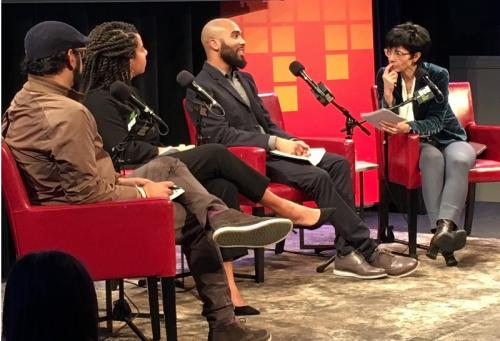
Link 1 https://www.echoinggreen.org/ideas/how-create-positive-social-change-2018
March 12, 2018
Social innovation pairs a problem-solving sensibility with new creativity, building alliances and relationships that translate ideas into action. As individuals find opportunities to share their dreams with one another, these moments can activate new potential for communities to thrive while including the voices and needs of many. Crafting a blueprint for an equitable future must also be balanced with "the fierce urgency of now" that Martin Luther King Jr. spoke of at the March on Washington. This balance is deeply rooted in persistence, building relationships in our communities to anchor these movements, and in each of us discovering what part we can play in upending injustices.
Enter Citizenship Now, a live event series Echoing Green presented in partnership with WNYC's The Greene Space this winter featuring four evenings of solutions-oriented discussion focused on Civic Engagement, Education, Climate Change, and Immigrationin the United States. Here the idea of citizenship is rooted in our relationship to our communities and the values each of us brings to design our present and future. It is also rooted in accountability and action. As Echoing Green Fellow Amanda Alexander noted, "citizenship means making sure we are dreaming big enough" while still staying accountable to the challenges we face in the present.
During the series, each panel of Fellows shared their thoughts on the delicate balance of the journey toward upending the status quo with taking action now. Host Jami Floyd prompted the panelists and audience members to share attainable goals they planned to make to create change in 10 days, 10 weeks, and 10 months. How will you take part in creating change now? Read below for four actionable steps you can take now.
1. Have an uncomfortable conversation.
Whether it's with a family member, a former high school classmate, or a U.S. senator, Renya Montoya encourages everyone to "lean into discomfort" and "hold each other accountable in a loving way" to learn and share differing perspectives on current events and how real people are directly affected.
2. Build a clean energy constituency.
Steph Speirs and Solstice are working to make solar energy affordable and accessible to everyone in the United States. Research community solar opportunities and coalitions in your neighborhood, and contact your representatives to inquire about solutions.
3. Volunteer your time and resources to champion future leaders.
Mentoring is impactful, but according to Yscaira Jimenez, being a champion or sponsor of someone in need of networks or monetary support has a more substantial effect on underrepresented talent. Pay for someone to take a course, make a connection, or schedule an informational meeting.
4. Show up, and don't give up.
Rohit's words remind us three important tenets of driving social progress: whatever your role, be present, engaged, and empathetic. Mine your experiences to engage in work that amplifies the voices and leadership of those directly impacted, and find ways to meaningfully engage with the challenges in the work ahead.










Add new comment